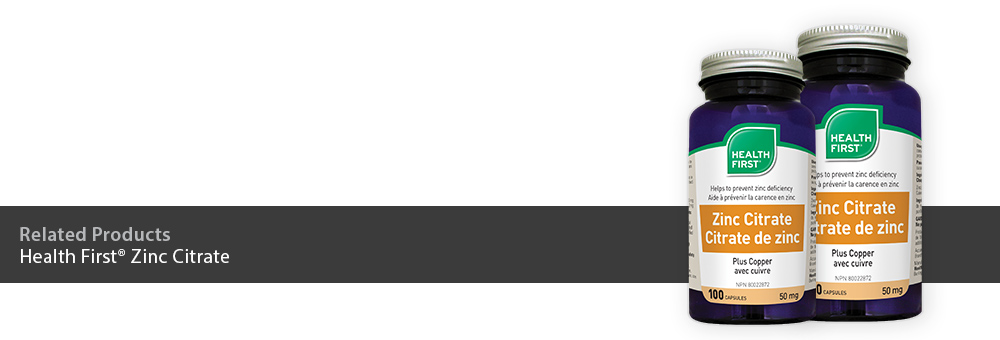

Are You Getting Enough Zinc?
An intake of minerals is essential to all living creatures – plants, animals and humans. Minerals are essential elements found in soil through the erosion of mineral salts. We consume minerals by eating the plants that grow in the soil and foods derived from animals that consume plants. Minerals are utilized in the human body for numerous biochemical activities including the functioning of the nervous, musculoskeletal and cardiovascular systems. Some minerals, such as calcium, are macrominerals needed in large amounts. Others, known as trace minerals, are needed in small amounts. One such trace mineral that is necessary for daily health is the mineral found at the end of the alphabetical roll call – zinc.
Zinc, like most minerals, is needed for a variety of life functions. It plays a role in immune function and healing. It is a strong antioxidant important to eye health. Zinc plays a role in energy production, protein metabolism, enzyme activity and overall growth and development. Although we do not need large amounts of zinc, many of us still do not get enough of it.
Zinc deficiency
While zinc deficiency is more common to those living in developing countries, it is not uncommon for those in Canada to have marginal zinc deficiencies that can have negative health effects. Health Canada estimates that 10-35% of Canadians are getting insufficient levels of zinc in their diet.1 That figure rises to 40% for men over the age of 70.2 Many theorize that our soils are becoming depleted of minerals such as zinc, due to modern farming methods.3
A lack of zinc can impair immunity and wound-healing and may lead to increased infections, undesired weight loss, hair loss, diarrhea, poor mental performance, as well as skin and male fertility issues.4
There are several groups that are more susceptible to marginal zinc deficiencies: those suffering from diarrhea, vegan and vegetarians, alcoholics, pregnant and breastfeeding mothers and anyone experiencing malabsorption issues, which often affect seniors.5
Eating a diet of zinc-rich foods is the key to maintain healthy levels of this nutrient. Both plant and animal derived foods are available with good zinc content – pumpkin seeds, cashews, mushrooms, egg yolks, and grass fed chicken, lamb and beef. For those who do not eat zinc containing foods or are unable to absorb sufficient amounts, zinc supplements are available.
Zinc supplements: Options and benefits
Zinc supplements can be found in various strengths and sources. Zinc citrate, zinc bound with citric acid, is considered a well absorbed form of zinc. In one study that measured zinc absorption through isotope tracing, zinc citrate showed improved absorption versus gluconate and oxide forms.6 Dosages for zinc supplements in Canada typically range between 10 mg and 50 mg, with the proper amount depending on an individual’s deficiency level. Zinc supplementation has been recognized for the following benefits:7
- Helps to maintain immune function
- Helps in connective tissue formation
- Helps to maintain healthy skin
- Helps the body to metabolize carbohydrates
- Helps the body to metabolize proteins
- Helps the body to metabolize fats
Copper with zinc for balance
It is important to prevent zinc deficiency, but care must be taken when supplementing. Taking zinc as a single ingredient supplement can have unintended consequences. While helping to increase one’s zinc levels, supplementing with a high potency of zinc alone for long periods of time may cause a deficiency of another mineral: copper. This is due to competition in the intestinal tract between these two minerals. In fact, Health Canada recommends that any adult supplementing with more than 30 mg of zinc per day ensure they are getting at least 2 mg of copper.8 Copper, like zinc, is involved in human immune health.
A balanced solution: Zinc Citrate Plus Copper
Health First® Zinc Citrate Plus Copper is a good choice for those that are deficient in zinc. This formula is been designed for high absorption and mineral balance. It contains zinc from citrate source for easy absorption at a potent 50 mg level. The formula also contains 2 mg of copper, as per Health Canada recommendation, to maintain a proper balancing of the body’s copper levels.
References:
1. Health Canada. “Do Canadian Adults Meet Their Nutrient Requirements Through Food Intake Alone?” 2012. Cat. No.: H164-112/3-2012E-PDF.ISBN: 978-1-100-20026-2
2. lbid.
3. “Dirt Poor: Have Fruits and Vegetables Become Less Nutritious?” Scientific American. April 27, 2011.
4. Physician’s Desk Reference. Monograph – Zinc. 2001. Pp. 536-537.
5. lbid.
6. Wegmuller, Rita et al. ‘Zinc Absorption by Young Adults from Supplemental Zinc Citrate Is Comparable with That from Zinc Gluconate and Higher than from Zinc Oxide”. Journal of Nutrition. November 20, 2013. doi: 10.3945/jn.113.181487
7. Health Canada. Monograph: Zinc (from non-picolinate sources). Natural Health Products Database. 2016.
8. lbid.
